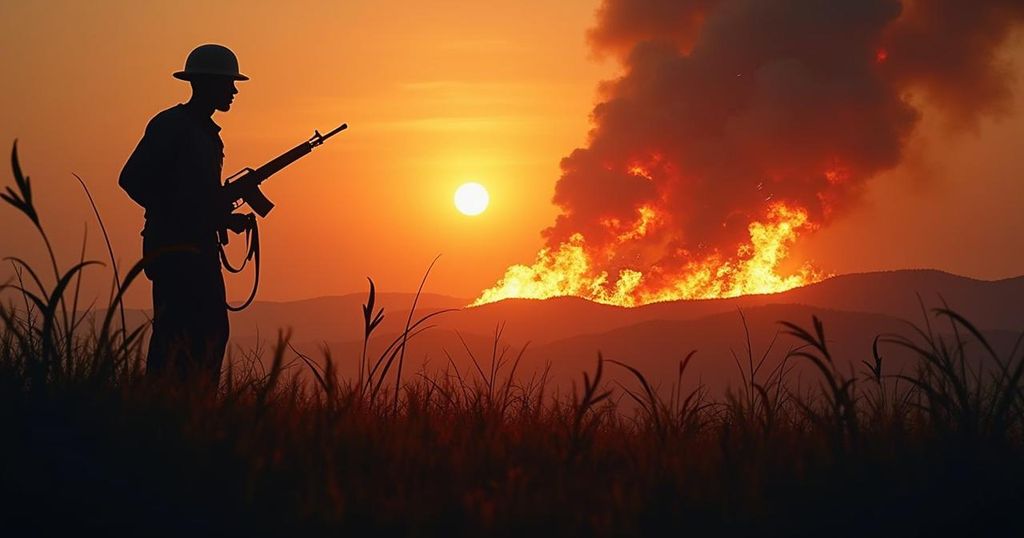Escalating Humanitarian Crisis in the Democratic Republic of the Congo Linked to Health Threats and Conflict

The Democratic Republic of the Congo is facing a severe humanitarian crisis with over 25 million people in need of assistance, exacerbated by ongoing conflict, mass displacement, and health threats such as Mpox. The WHO reports significant food insecurity and health challenges, including a troubling rise in infectious diseases. The recent withdrawal of the UN stabilization mission further complicates efforts to restore stability and aid to the region.
The Democratic Republic of the Congo (DRC) is currently facing a critical humanitarian emergency, with over 25 million individuals in dire need of assistance, as reported by the United Nations health agency. The ongoing conflict, particularly in the mineral-rich eastern regions, has led to considerable violence, mass displacements, and a multitude of health and security crises. Dr. Adelheid Marschang, Senior Emergency Officer at the World Health Organization (WHO), stated that DRC has the highest number of people in need of aid worldwide, with a staggering 7.4 million displaced, largely due to the resurgence of the M23 militia since 2022. The dire situation has exacerbated existing vulnerabilities, as approximately 40 percent of the population—40.8 million—faces serious food shortages. Among this, 15.7 million individuals are experiencing severe food insecurity, leading to increased risks of malnutrition and infectious diseases. Dr. Marschang warned that without immediate intervention, over one million children may suffer from acute malnutrition shortly. The DRC is also contending with outbreaks of various diseases, including cholera, measles, and Mpox. This year alone, there have been over 11,000 reported cases of Mpox, predominantly affecting children, with the country experiencing over 20,000 cases and more than 1,000 deaths from the virus since January 2023. Given the recent alarming reports of a new strain of Mpox in South Kivu, health officials are concerned about the virus spreading in overcrowded camps, where military activities hinder effective containment measures. Furthermore, the humanitarian situation is made worse by the withdrawal of the UN Stabilization Mission in DRC (MONUSCO), which has concluded its operations after two decades. This strategic disengagement has left a power vacuum that has allowed rebel groups like M23 to increase violence and instability, raising concerns over a potential broader regional conflict. In light of the underfunding of humanitarian efforts—only 16 percent of the proposed 2024 Humanitarian Response Plan is currently funded—there is an urgent need for international support and intervention.
The ongoing humanitarian crisis in the Democratic Republic of the Congo is rooted in decades of violent conflict and political instability, exacerbated by a combination of factors including economic deprivation, ethnic strife, and foreign interference. The eastern part of the country is particularly troubled, housing lucrative mineral resources amidst civil upheaval. The situation has led to substantial displacement, with millions forced from their homes and many enduring persistent health crises. Recent outbreaks of diseases like Mpox, compounded by insecurity, have placed immense strain on an already fragile healthcare system. The international community faces significant challenges in addressing the dual crises of humanitarian need and regional security, particularly in light of resource constraints.
In conclusion, the humanitarian situation in the Democratic Republic of the Congo is critical, characterized by overwhelming need as a result of conflict and health emergencies. The attention to food security, disease outbreaks, and the need for effective humanitarian responses is imperative. Without immediate and comprehensive action, the ongoing crises threaten to escalate further, jeopardizing the well-being of millions, particularly vulnerable populations such as children. International support and funding are crucial in stabilizing the region and restoring hope to those affected.
Original Source: news.un.org






